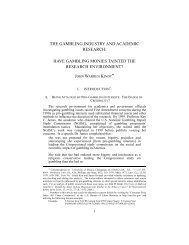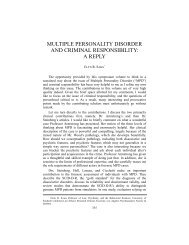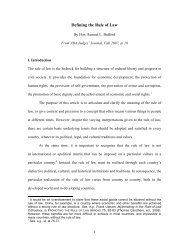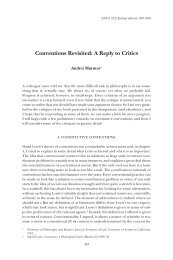1 Regulating Sex Work Adrienne D. Davis VERY ROUGH DRAFT ...
1 Regulating Sex Work Adrienne D. Davis VERY ROUGH DRAFT ...
1 Regulating Sex Work Adrienne D. Davis VERY ROUGH DRAFT ...
Create successful ePaper yourself
Turn your PDF publications into a flip-book with our unique Google optimized e-Paper software.
prostitute, while suffering stigma herself, may be thought to perpetuate gender<br />
hierarchy.” 324 Another philosopher, Margaret Radin, posits a “domino effect,” in which<br />
[fill in]. 325 Finally, Laurie Shrage offers particularly harsh criticism: “Just as an Uncle<br />
Tom exploits noxious beliefs against blacks for personal gain, and implies through his<br />
actions that blacks can benefit from a system of white supremacy, the prostitute and her<br />
clients imply that women can profit economically from patriarchy.” 326<br />
A related concern is that legalized sex markets will yield another externality—the<br />
intensification of current race and gender norms that feminists find repugnant.<br />
Mainstream sex markets value and valorize mainstream beauty norms. These shift over<br />
time, but some, for instance youth and whiteness and “ability,” remain fairly static.<br />
Hence, as discussed in Section III, non-white women, older women, and disabled women<br />
all find themselves disadvantaged in sex markets. Not only is it more difficult for them<br />
to find work, but they are often paid less, labor in less savory markets, and find<br />
themselves consigned to niche or fetish markets that may or may not require stereotypical<br />
performances that many workers find offensive. Of course, it is not inexorable that<br />
legalization will reinforce market norms. However the last fifty years have seen limits of<br />
feminist efforts to perform counter-education projects in the pornography and exotic<br />
dancing markets. For all of the above reasons, many feminists contend the externalities<br />
warrant sex work’s on-going criminalization. It is unclear how the externalities<br />
associated with sex work will weigh against discerned benefits, which will need to be<br />
clearly articulated.<br />
Of course, others strongly resist the attributions of these externalities.<br />
Responding to Radin, Sylvia Law observes that:<br />
Images and reality of degradation of women, violence, and exploitative sexuality<br />
are pervasive in U.S. culture. But it is difficult to see commercial sex as the main<br />
culprit. Despite the fact that the U.S. is expensively committed to the prosecution<br />
of commercial sex, the commodified discourse that Radin fears is pervasive in the<br />
magazines at the supermarket check-out line, on commercial airlines, in network<br />
television, and, in more explicit forms, on cable TV, the Internet and at<br />
newsstands. Indeed these pedestrian forms of sexual commodification may be<br />
more pernicious than commercial sex simply because they are so ordinary. It is<br />
not clear that legalization of commercial sex would lead to an increase in sex<br />
commodification talk, even if advertising were not banned. 327<br />
324324 Nussbaum, supra note [x], at 705. [Stigma rationale for prohibiting sex discrimination (doctors and<br />
flight attendants) w3ould seem to be strong re strippers! (“the social message that women are primarily<br />
objects for men's sexual gratification” Yuracko 151); Mikulski 20 “If there was one thing I could do, it<br />
would be to get rid of the stigma.”)]<br />
325 [add Radin citation]. But see [add citation] (contending that Radin’s “’domino effect’ argument<br />
implicitly suggests that the exploitation of mostly poor women that results from the criminalization of<br />
commercial sex is counter-balanced by benefits to people whose sexual and economic lives are closer to the<br />
visionary ideal she articulates.”) (footnote omitted).<br />
326 Shrage, supra note [x], at 356-57. But see Chancer, supra note [x], at 164 (“Shrage’s blaming of the<br />
prostitute for “Uncle Tomming” and reinforcing a patriarchal system makes no more sense than it would to<br />
accuse other underground economic workers of collusive capitalism.”).<br />
327 Law, supra note [x], at 538-39 (footnote omitted). Chancer concurs:<br />
In terms of gender, the stigmatization also singles out prostitutes from other women who also use<br />
their bodies to reap rewards in a society common with Hollywood actresses for beauty, for<br />
example, with models, singers, Madonna (her ‘good girl’ name purposefully ironic in this context)<br />
55














